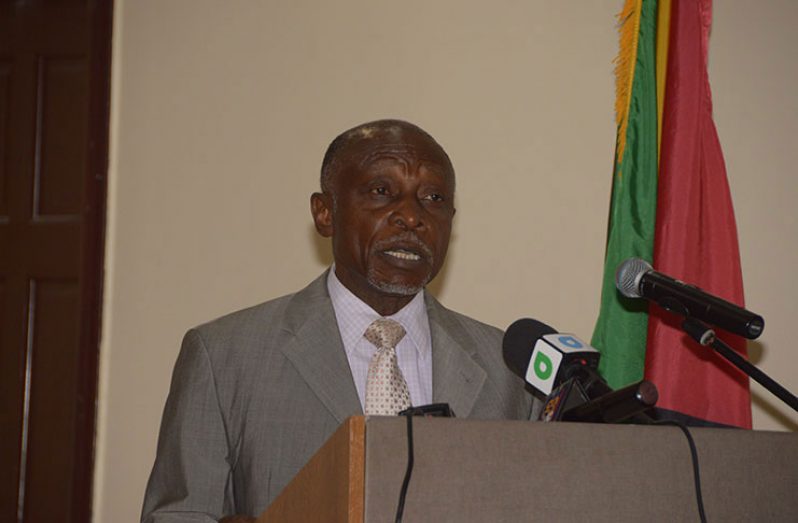…Greenidge suggests, says oil resource not a curse
FORMER Minister of Foreign Affairs, Carl Greenidge, believes acquiring shares in Exxon Mobil is an option that government could explore in the future when resources start coming in from the oil and gas industry, scheduled to come on stream next year.
Greenidge noted that government is no stranger to private investments, and suggested that a step towards owning shares in Exxon would be a worthwhile investment for the country. “The government is at liberty to acquire shares in Exxon, it can be a partner in Exxon. [Currently] government partnership is largely one of sharing exploitation of resources, but we can use some of the resources to buy some of the shares of Exxon,” Greenidge said as he delivered remarks on Sunday at the Buxton First of August Movement (FAM-Buxton) annual Eusi Kwayana Emancipation Symposium.
“We have bought shares in private companies before. So there are options in looking at the future that oil and gas has for us, you have to look carefully at what can be done, what has been done.”
Greenidge, who is currently the Foreign Secretary was one of five panelists who gave remarks at the event, the others being Attorney, Nigel Hughes; University of Guyana History and Caribbean Studies Lecturer, Dwayne Benjamin; IDPADA-G Administrative Officer, Glenyss James; and FAM-Buxton Coordinator, Dr. David Hinds.
This year, the event was held under the theme, “The Coming Election and the African Guyanese Emancipation Agenda” with a focus on the theme’s connection to the coming oil and gas industry.
With 13 oil discoveries since 2015, Exxon Mobil is scheduled to begin Guyana’s maiden oil production from the Liza Phase 1 development in early 2020, expecting to initially extract an estimated 120,000 barrels of oil per day. There have been conversations on the looming industry, its management and just how much Guyana will be able to benefit from the resources garnered.
Guyana’s Production Sharing Agreement (PSA) with Exxon has the country poised to receive 2 percent royalty on petroleum produced and sold. The Department of Energy has since noted plans to raise the royalty on future oil licenses issued, though the plans are not expected to affect current licenses.
Oil is not voodoo
Greenidge dismissed fears that the oil and gas industry could leave Guyana in a worst state. Globally, there is what has become known as the “resource curse” or “paradox of plenty”, whereby despite the vast resources countries fail to see massive economic development.
However, Greenidge said, it is how the resources are managed, and not the resource itself, that plays a crucial role in ensuring countries do not befall the curse. “The biggest nonsense is a story that tells it’s going to leave us worst off than we were before, we didn’t say that when we discovered bauxite in the 1900s, manganese in the 1950s, the fisheries in the late 1960s. Oil is not voodoo, it is not magic, it is a commodity. To an economist there is no difference between a barrel of oil and a roll of cloth, they are commodities, they are used for different purposes but the difference of consequence is the management,” he noted. “The price of oil today is so high that if you possess oil you can do magic in a very short space of time because of the income it commands. You have a resource you must manage it sensibly.”
Oil and gas discussions are taking center stage as the country gears for its next elections. Greenidge told those gathered that citizens have a role to play in ensuring this good management of the resources by holding those in power accountable.
“There are responsibilities for you as members of the electorate. I don’t have all the solutions for you but everyone has responsibility to be aware, make sure your voice is heard. A party has a manifesto. It promises to do certain things, you see that they don’t do it and you have to let them know that you are concerned about their failure to do it. That is what some of the more mature economies do. Don’t wait until the end of their five years,” he said.
“You are an intelligent constituency look at what your government is doing and ensure that when resources are available the resources are used for the benefit of the country. When it comes to oil the main benefit to the country will be the income coming from the various taxes, you cannot look at the royalty alone and pronounce on the utility and appropriateness of royalty.”
Many have much riding on their expectations of the economic boom that the oil and gas industry is expected to bring to Guyana. Greenidge also sought to address the issue of the border controversy with Venezuela and that country’s claim to certain sections of Guyana’s territory, including offshore areas where oil exploration is currently taking place. Greenidge outrightly dismissed a suggestion in a section of the media by a University professor that Guyana should relinquish some amount of territory to Venezuela to end the controversy.
“There was a story saying the government is exaggerating the risks, there’s no risk in relation to Venezuela all you have to do is give Venezuela 20 percent, give them 20 percent of all your ocean resources and take more money from Exxon. Is any part of the fees to Exxon going to be worth more than 20 percent of the resources in our seas, which is not just petroleum? And yet that man is given credence in a newspaper in Guyana. I am not aware that either the latter government, or the current one has a mandate to give away 20 percent of our resources,” Greenidge noted.



.jpg)








